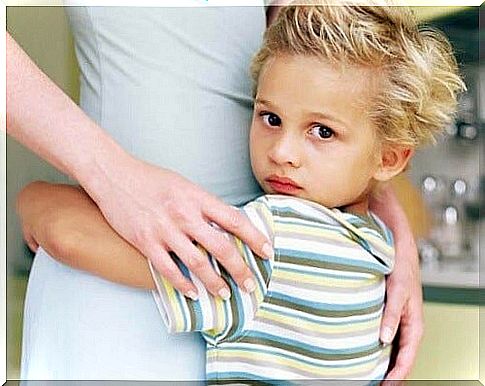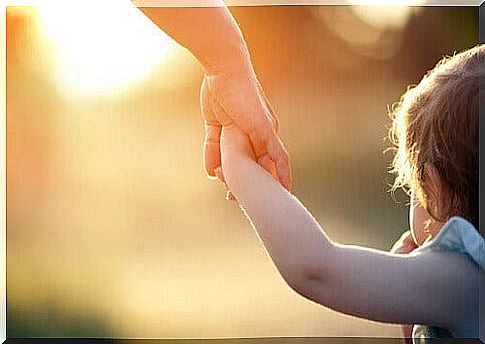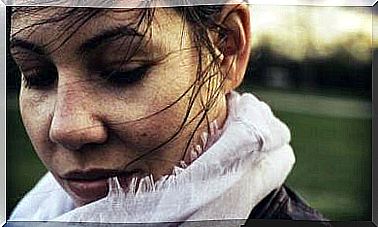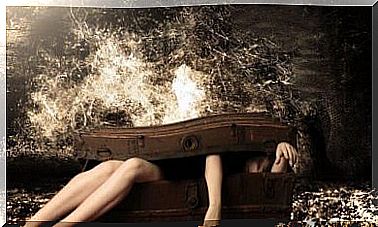The Consequences Of Overprotection

We shouldn’t confuse protection with over-protection. Protection from our children is vital to them. When they are young, they need us and depend on us for almost everything.
All animals, by instinct, protect and take care of their puppies for a certain period. Thus, when the puppy can get by on his own, he will begin his journey alone in the world, detaching himself from his parents.
In the case of human beings, this protection is more prolonged over time and not only, on many occasions, what at the beginning was a way to take care of their children and keep them safe can turn into a really harmful attitude for their mental health.. In this case we speak of overprotection.
It could be said that overprotection of a child goes far beyond covering and satisfying his or her basic needs . It means thinking for a child, making decisions for him, solving all his problems; living for a child, when he is a person who has to develop his personal skills if he is to be successful in the world.
There are many parents who continually repeat to their children “Don’t do this, you can hurt yourself”, “You won’t go to sleep with your friend because I don’t know that house”, “You won’t go on a trip because it can be dangerous” and no, no, no.
Logically with this attitude we are only able to instill fear in our children, as well as the false idea that the world is a dangerous place.
On the other hand, these parents are very permissive in the sense that they generally do not set limits or clear rules that children can understand and internalize. In addition to this, if the children violate these widespread rules, the parents do not establish definite consequences for fear of doing harm to their children, but in reality the consequences are used to educate, not to harm.
They do not even impose obligations and responsibilities on their children that may be appropriate for their age, arguing that “they don’t want to do it”, “they do it badly” or “poor thing is too young”.
These are the dysfunctional ideas of overprotective parents. They think that by overprotecting their children, they will take care of their self-esteem and that they will not harm their mental health, because they will not create moments of embarrassment or frustration and that they will be happy because “they will never miss anything”.

What are the consequences of overprotection?
Fearful people
It makes sense: if we have spent our lives admonishing our children about all the “dangers” they might encounter in life, however unlikely or insignificant they may be, they will live in fear of what “might happen”.
Furthermore, if we have never given them the tools to face and solve their problems on their own, they will be unable to deal with them and may even become dependent on someone else to solve them for them whenever they find themselves in a complicated situation.
Dependent people
As mentioned in the previous point, if we don’t teach them to make their own decisions, manage their life or solve their problems, they will always depend on someone to do it for them because they don’t know how to do it themselves.
This, in turn, creates self-esteem problems; if a person understands that he does not know how to manage alone in life or if he never takes the initiative for anything, his conception of himself will, unfortunately, be that of being “useless” and always needing someone by his side.
Little tolerance for frustration
Their parents have always made sure that they do not hurt them or that they feel frustrated by not getting what they want; they gave them everything they asked for the moment they asked for it and minimized the pain. These children, therefore, have not learned to tolerate that in life things do not always go as one expects them, like it or not, this is reality.
It may happen that, under the protection of his family, a child feels he has everything and that his parents are almost valets, always ready to serve him when he needs it.
However, sooner or later, life and society will tell him that this is not the way the world is and that there are things that will inevitably hurt and frustrate us. The most likely thing is that they react to these situations with anger, need and even aggression, which can cause problems in social relationships and in life in general.
Cancellation of the development of personal skills
If we constantly anticipate to children what may or may not happen, if we do not allow them to learn from their mistakes and if we do everything for them, obviously, we undermine their ability to learn.
If even before the child has to go to the bathroom, we are already forcing him to go “because, never mind you want to go later and you can’t find a place to go to the bathroom”, he will not be able to understand his signals on his own. physiological when you need to go to the bathroom.
If we don’t let it fall, it will never learn what it should or shouldn’t do. People learn through the negative and positive consequences of their direct experiences, which is why there is an indisputable need for the child to experience the world to learn how to act better in the future.
Everything you learn can also be unlearned and this is good. If you have been an overprotected child, now that you are an adult, it is your responsibility to re-educate yourself to grow as a person and to improve.
And you, parents who have just identified with this article, we will tell you that there is still time to change your mindset if you want to help your children to be autonomous, independent and happy people. Not being overprotective is the best gift you can give your children.









